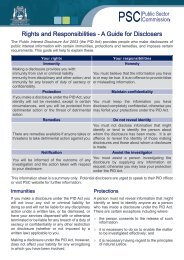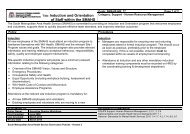Archived document - Public Sector Commission - The Western ...
Archived document - Public Sector Commission - The Western ...
Archived document - Public Sector Commission - The Western ...
You also want an ePaper? Increase the reach of your titles
YUMPU automatically turns print PDFs into web optimized ePapers that Google loves.
e-Government Strategy for the <strong>Western</strong> Australian <strong>Public</strong> <strong>Sector</strong><br />
Effecting Change: <strong>The</strong> Key Enablers of e-Government<br />
30<br />
1. Leadership<br />
e-Government is a whole-of-government change that will require<br />
transformational leadership and commitment from both the political and<br />
administrative arms of government. <strong>The</strong> success of any fundamental<br />
change rests in the degree of ownership and commitment that those<br />
making the critical decisions have to the transformation process. In a<br />
rapidly developing environment, such as ICT, this commitment to the<br />
bigger picture is even more important.<br />
<strong>The</strong> Role of OeG<br />
OeG states in its Strategic Plan that one of the four key objectives of OeG<br />
is to provide strategic leadership by ‘leading the e-government agenda in<br />
the <strong>Western</strong> Australian <strong>Public</strong> <strong>Sector</strong>’.<br />
This leadership will take a number of forms. <strong>The</strong> e-Government Strategy<br />
for the <strong>Western</strong> Australian <strong>Public</strong> <strong>Sector</strong> represents an important<br />
leadership role for OeG in elevating e-government on the public sector<br />
agenda and setting a course for agencies to follow in progressing e-<br />
government transformation.<br />
Equal to establishing a strategic foundation for e-government<br />
development, OeG has several on-going leadership roles such as:<br />
• Supporting and nurturing collaboration between agencies in their<br />
development of e-government initiatives;<br />
• Raising awareness of e-government and its benefits both within<br />
government and in the community;<br />
• Identifying gaps where policy, legislative and operational frameworks<br />
need developing or revising to facilitate e-government initiatives; and,<br />
• Initiating projects that require a whole-of-government management<br />
approach. That is, projects that would have no logical lead agency due<br />
to their whole-of-government nature. An example of such a project<br />
would be initiating the development of a common groupware system for<br />
government in collaboration with agencies.<br />
It is important to note that none of the leadership roles assumed by OeG<br />
in any way reduce the importance or impetus for agency participation in<br />
developing e-government initiatives.<br />
‘Leadership and commitment, at both political and administrative levels, are crucial<br />
to managing change. Committed leaders are required to deal with disruptive change, to persevere<br />
when benefits take time to emerge, to respond when things go wrong and to establish<br />
visions and plans for the future’.<br />
Organisation for Economic Co-operation and Development, (2003), <strong>The</strong> e-Government Imperative, www.oecd.org

















